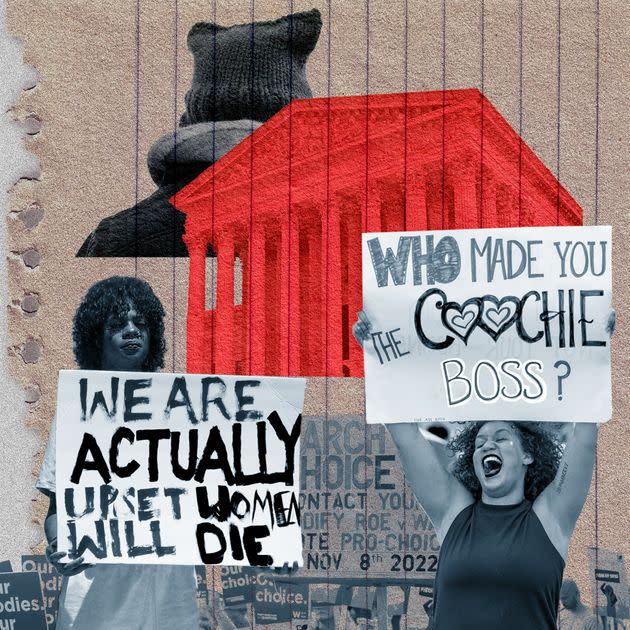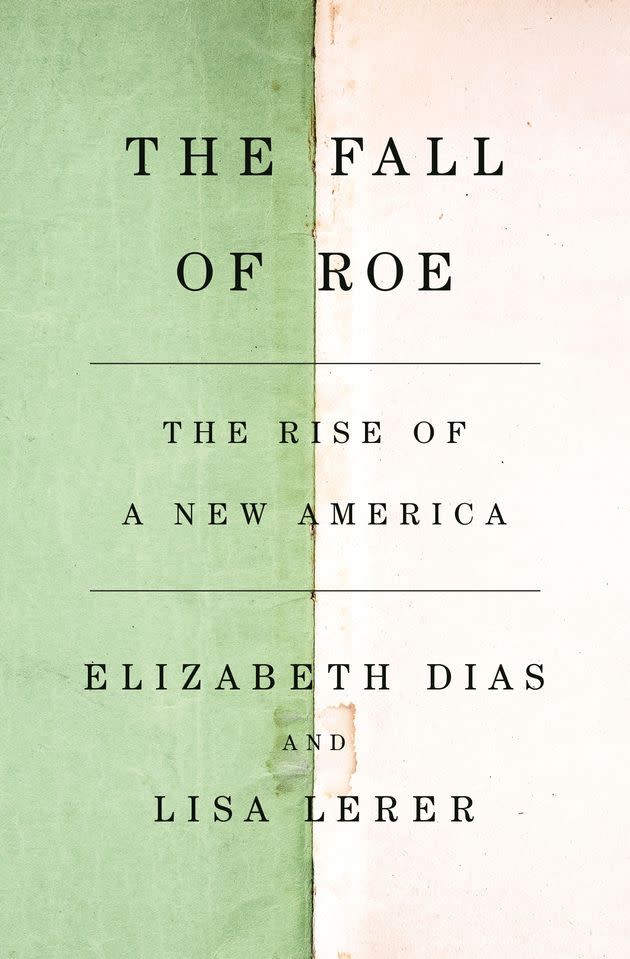‘The Fall of Roe’ Is More Than An Account Of History. It’s A Warning About The Future.

Somepeoplemay believe that the end of Roe v. Wade was simply a matter of luck: Following the then-black swan event of Donald Trump winning the 2016 election, Trump got to appoint two Supreme Court Justices in his first two years and a third after an octogenarian passed away weeks before the 2020 election.
The court then had a 6-3 conservative supermajority, and that was that. But the project to overturn the federal right to abortion was much more calculated, involving an alliance of Republican groups aiming to reshape Congress, the courts and American life. And while conservatives may have won a huge battle, it’s not the end of their unholy war.
That’s the story New York Times reporters Elizabeth Dias and Lisa Lerer tell in their new book, “The Fall of Roe,” a deeply reported accounting of the machinations of anti-abortion activists and lawmakers to reverse the 1973 ruling that reshaped both society and women’s lives. The book recounts the conservative network’s past victories, yes, but is also a window into the future, highlighting just how crucial November’s elections are for our rights and freedoms.
That’s because if Trump wins a second term, this conservative coalition will bring even more litigation to strip away people’s rights — and would likely face a Supreme Court that’s even more untouchable than it is now.

The group most connected to Dobbs v. Jackson Women’s Health Organization, the case that overturned Roe, is Alliance Defending Freedom, a far-right Christian advocacy group. But ADF certainly didn’t do it alone, per Dias and Lerer — correspondents on religion and politics, respectively. In many ways, two other organizations laid the groundwork for this victory: The Federalist Society, a judicial group that drafted a list of Trump’s Supreme Court nominees, judges Trump said were all opposed to Roe; and Susan B. Anthony Pro-Life America, an anti-abortion political group with an affiliated PAC.
And they’re all funded with massive amounts of dark money, including from billionaires like the Koch brothers. The 30,000-foot view is that these groups worked together to draft and pass unpopular state laws and have conservative lawyers defend them in front of friendly judges who had been confirmed to lifetime appointments by Republican senators. The network could use this playbook on any number of issues in the future.
ADF wrote Mississippi’s 15-week abortion ban at issue in the Dobbs litigation. Dias and Lerer report that a conservative Wisconsin lawyer suggested crafting a ban at exactly 15 weeks basically as a dare for abortion rights proponents to challenge it, believing the Supreme Court would find the ban reasonable and gut Roe without fully overturning it.
The lawyer, Misha Tseytlin, allegedly floated the idea at a Trump victory party hosted by Federalist Society Chair Leonard Leo, and then someone connected to ADF heard it, and the organization had Tseytlin present his theory at a July 2017 ADF summit. (This story shows that conservatives picked 15 weeks not because of emerging medical research, but because abortion rights advocates had chosen not to sue over previous 20-week bans designed to challenge Roe.)
ADF drafted a model bill, identified states that might pass it and that had anti-abortion attorneys general who would defend it, and started talking to lobbyists. Then-Mississippi Gov. Phil Bryant (R) signed the 15-week ban into law in 2018, and litigation began.
By the time the Supreme Court was considering taking the case, it was early September 2020. Then Justice Ruth Bader Ginsburg died, and Trump nominated Amy Coney Barrett, giving a 5-4 court a 6-3 conservative supermajority, with three Justices appointed by Trump — a president who lost the popular vote. The court agreed to hear the case in May 2021, and the rest is history.
That playbook worked for striking down Roe, but the coalition is not done. Dias and Lerer write that ADF, in particular, will “work to restore an understanding of marriage, the family and sexuality that reflects God’s creative order.” First, abortion opponents think Dobbs is not enough; they want a nationwide ban starting at egg fertilization.
ADF is involved in two abortion-related Supreme Court cases this term, and Kristen Waggoner, its CEO and general counsel, admitted in March that its lawsuit over the abortion pill, mifepristone, is part of a long-term strategy to restrict abortion at the federal level because Dobbs was never the end goal.
What is? A nationwide abortion ban rooted in the view that life begins when an egg is fertilized. “We believe that human life is precious, that it deserves protection from conception until natural death,” Waggoner told Politico this past March. “We believe that the 14th Amendment protects persons and that includes unborn persons, and that the right to life is protected in the Constitution and in our founding document.”
The legal theory of personhood from fertilization could also be weaponized against the right to use contraceptionestablished in 1965’s Griswold v. Connecticut — a precedent Justice Clarence Thomas called on the court to overrule. Though many anti-abortion activists falsely claim that certain methods of birth control are abortions because they prevent fertilized eggs from implanting in the uterus, Waggoner chafed at the suggestion that ADF’s positions could lead to restrictions on contraception.
She told Politico that “ADF has never advocated for limitations on access to contraception” while later conceding that it’s all about how you define abortion and contraception. “I’m getting uncomfortable with the way you’re asking questions, because the mechanism of action for birth control is different depending on what that birth control is,” she said, per Politico. “For example, Ella would be considered an abortifacient.”
Ella is emergency contraception, and no credible doctor thinks it causes abortions, yet multiple states are already trying to legally reclassify emergency contraception as abortion. (Iowa Sen. Joni Ernst even explained her vote against the Right to Contraception Act by saying that she introduced a separate bill that doesn’t protect emergency contraception.) This is an area to watch in the coming months and years.
But getting the court to declare fetal personhood might take a while, and a backup plan appears to be trying to resuscitate the Comstock Act of 1873. ADF is arguing in the abortion pill case that the long-dormant anti-vice law means no one can mail abortion pills to other states, even those where abortion is legal.
And in arguments, two justices seemed open to the idea. Anti-abortion lawyer Jonathan Mitchell — the man who wrote the Texas bounty hunter law that nullified Roe months before Dobbs — is working with activist Mark Lee Dickson to pass local ordinances claiming Comstock bans the mailing of abortion pills. And he’s deploying the same tactic of pro-bono legal representation that ADF used in Mississippi. Mitchell told The Nation he hopes to get lawsuits over the measures in front of the Supreme Court “as quickly as possible.” (Mitchell, I must note, is also litigating a case that gutted minors’ access to birth control in Texas.)
ADF also has its sights set on reversing the 2015 ruling establishing marriage equality, but Waggoner also seems to resent when journalists ask her about Obergefell v. Hodges. (That ruling was 5-4, and two of the Justices in the majority are no longer on the court — you only need four votes out of nine to take a case.) “I’m worried you’re gonna just use a choice little quote, and anybody that reads the article is going to think I’m abandoning Obergefell, and I am not,” she told The New Yorker. “I think it is wrong and it should be reversed, but I don’t wake up in the morning thinking about how to do that.”
The group wants to roll back transgender rights in employment (Bostock v. Clayton County, 2020) and expand parental rights (Troxel v. Granville, 2000) so that parents can override the medical needs of their children with gender dysphoria, The New Yorker reports. ADF is also behind the rash of state laws banning gender-affirming care for minors and trans kids’ participation in sports — the group wrote model legislation. We’re watching a redux of the anti-abortion battle plan in real time. “It’s not that the Court is going to say, ‘Gender ideology is bad,’” Waggoner told The New Yorker. “But I do think the Court could say, ‘Parental rights are fundamental rights.’”
This far-right Christian coalition is coming for practically every civil right people in the U.S. have gained since the 1960s. It wants to oppress queer people, young people and women, and there are very few obstacles in the way of it getting everything it wants. That’s the larger message of “The Fall of Roe” — that religious conservatives are extremely organized and see their work as far from over.
The next president could appoint multiple Supreme Court justices who may be asked to rule on cases challenging the precedents in the crosshairs of ADF, the Federalist Society and Susan B. Anthony Pro-Life. Justices Clarence Thomas and Samuel Alito could retire, cementing a 6-3 court for another generation — or the balance could tip even further to 7-2 should tragedy befall a liberal Justice.
Our freedoms in this country currently depend on the life expectancy of nine unelected people in robes, and the court absolutely needs reforms, including term limits. Keep all the right’s larger project in mind when you vote this fall, because this network of groups is counting on people to tune out.

